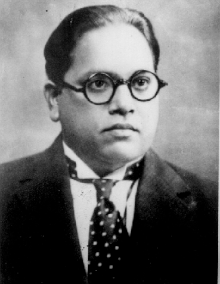User:Vaibhav143
Early life and education[edit]

Ambedkar was born in the town and military cantonment of Mhow in the Central Provinces (now in Madhya Pradesh).[2] He was the 14th and last child of Ramji Maloji Sakpal and Bhimabai.[3] His family was of Marathi background from the town of Ambavade (Mandangad taluka) in Ratnagiri district of modern-day Maharashtra. They belonged to the Mahar caste, who were treated as untouchables and subjected to socio-economic discrimination.[4] Ambedkar's ancestors had for long been in the employment of the army of the British East India Company, and, his father served in the Indian Army at the Mhow cantonment.[citation needed]
Belonging to the Kabir Panth, Ramji Sakpal encouraged his children to read the Hindu classics. He used his position in the army to lobby for his children to study at the government school, as they faced resistance owing to their caste. Although able to attend school, Ambedkar and other untouchable children were segregated and given little attention or assistance by the teachers. They were not allowed to sit inside the class. Even if they needed to drink water somebody from a higher caste would have to pour that water from a height as they were not allowed to touch either the water or the vessel that contained it. This task was usually performed for the young Ambedkar by the school peon, and if the peon was not available then he had to go without water, Ambedkar states this situation as "No peon, No Water".[5] He was required to sit on a gunny sack which he had to take home with him.[6]
Ramji Sakpal retired in 1894 and the family moved to Satara two years later. Shortly after their move, Ambedkar's mother died. The children were cared for by their paternal aunt, and lived in difficult circumstances. Three sons – Balaram, Anandrao and Bhimrao – and two daughters – Manjula and Tulasa – of the Ambedkars would go on to survive them. Of his brothers and sisters, only Ambedkar succeeded in passing his examinations and graduating to a high school. Bhimrao Sakpal Ambavadekar the surname comes from his native village 'Ambavade' in Ratnagiri District.[7] His Brahmin teacher, Mahadev Ambedkar, who was fond of him, changed his surname from 'Ambavadekar' to his own surname 'Ambedkar' in school records.[7]
- ^ Frances Pritchett. "youth". Columbia.edu. Archived from the original on 25 June 2010. Retrieved 17 July 2010.
{{cite web}}: Unknown parameter|deadurl=ignored (|url-status=suggested) (help) - ^ Jaffrelot, Christophe (2005). Ambedkar and Untouchability: Fighting the Indian Caste System. New York: Columbia University Press. p. 2. ISBN 0-231-13602-1.
- ^ Pritchett, Frances. "In the 1890s". Archived from the original (PHP) on 7 September 2006. Retrieved 2 August 2006.
{{cite web}}: Unknown parameter|deadurl=ignored (|url-status=suggested) (help) - ^ Encyclopædia Britannica. "Mahar". britannica.com. Retrieved 12 January 2012.
- ^ Frances Pritchett. "Waiting for a Visa, by B. R. Ambedkar". Columbia.edu. Archived from the original on 24 June 2010. Retrieved 17 July 2010.
{{cite web}}: Unknown parameter|deadurl=ignored (|url-status=suggested) (help) - ^ KURIAN, SANGEETH. "Human rights education in schools". The Hindu.
- ^ a b "Bhim, Eklavya". outlookindia.com. Archived from the original on 11 August 2010. Retrieved 17 July 2010.
{{cite web}}: Unknown parameter|deadurl=ignored (|url-status=suggested) (help)
